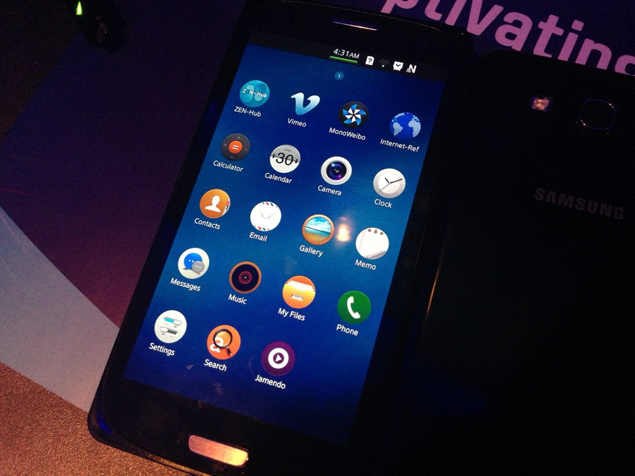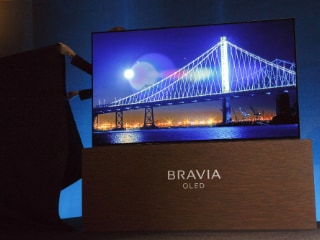- Home
- Mobiles
- Mobiles News
- First Tizen based smartphones coming this March, says Japan's NTT Docomo
First Tizen-based smartphones coming this March, says Japan's NTT Docomo

The open source offering called Tizen, based on the Linux operating system, is expected to be installed on telephones sold from the end of March, NTT Docomo spokesman Jun Otori told AFP.
Tizen is the product of a tie-up among companies from Japan, China, South Korea, Europe and the United States and comes despite tensions among the Asian neighbours over territorial disputes.
The consortium that makes up Tizen Association include US giant Intel, Japan's Fujitsu, South Korea's Samsung and LG, China's Huawei, and European mobile carriers Vodafone and Orange.
"Unlike Android and iOS, Tizen allows us to develop freely whatever we envision because it is an open-source operating system," said Otori.
Open-source operating systems are not proprietary.
Japanese mobile phones once led the world with cutting-edge technologies such as Docomo's i-mode, the world's first mobile web service, and software including electronic payment systems.
But their glory faded quickly with the emergence of Apple's iPhone, as their concentration on catering to the quirks of domestic consumers saw them diverge from the rest of the world, a phenomenon dubbed "Galapagos Syndrome".
"With Tizen, we hope to revitalise Japanese-developed services and create new services more freely," Otori said.
Tizen is among a handful of new smartphone platforms expected to become available this year, challenging the stranglehold of the two market leaders, Android and iOS.
Android and Apple account for more than 90 percent of the surging smartphone market, with BlackBerry and Microsoft's Windows Phone vying for third spot.
Phones using operating systems based on the open-source platforms Linux and Mozilla's Firefox will be hitting the market this year, most likely in emerging markets.
Samsung's Tizen-equipped smartphone was likely to be unveiled next month around the time of the industry-wide exhibition Mobile World Congress in Barcelona, Spain, Japan's Mainichi Shimbun said Wednesday.
Samsung will put a Tizen smartphone on the market as early as this spring, the daily said, citing unnamed industry sources.
Separately, NTT Docomo, China's number two carrier China Mobile and South Korea's second-largest carrier KT are planning to share their mobile networks using high-speed LTE technology this year, in a bid to internationalise their businesses, the Mainichi said.
The reported move comes against the backdrop of rising cross-border business and tourism, and Docomo expects the planned cooperation to help stimulate the Asian market, it saidCatch the latest from the Consumer Electronics Show on Gadgets 360, at our CES 2026 hub.
Related Stories
- Samsung Galaxy Unpacked 2025
- ChatGPT
- Redmi Note 14 Pro+
- iPhone 16
- Apple Vision Pro
- Oneplus 12
- OnePlus Nord CE 3 Lite 5G
- iPhone 13
- Xiaomi 14 Pro
- Oppo Find N3
- Tecno Spark Go (2023)
- Realme V30
- Best Phones Under 25000
- Samsung Galaxy S24 Series
- Cryptocurrency
- iQoo 12
- Samsung Galaxy S24 Ultra
- Giottus
- Samsung Galaxy Z Flip 5
- Apple 'Scary Fast'
- Housefull 5
- GoPro Hero 12 Black Review
- Invincible Season 2
- JioGlass
- HD Ready TV
- Laptop Under 50000
- Smartwatch Under 10000
- Latest Mobile Phones
- Compare Phones
- Red Magic 11 Air
- Honor Magic 8 RSR Porsche Design
- Honor Magic 8 Pro Air
- Infinix Note Edge
- Lava Blaze Duo 3
- Tecno Spark Go 3
- iQOO Z11 Turbo
- OPPO A6c
- Lenovo Yoga Slim 7x (2025)
- Lenovo Yoga Slim 7a
- Lenovo Idea Tab Plus
- Realme Pad 3
- Moto Watch
- Garmin Quatix 8 Pro
- Haier H5E Series
- Acerpure Nitro Z Series 100-inch QLED TV
- Asus ROG Ally
- Nintendo Switch Lite
- Haier 1.6 Ton 5 Star Inverter Split AC (HSU19G-MZAID5BN-INV)
- Haier 1.6 Ton 5 Star Inverter Split AC (HSU19G-MZAIM5BN-INV)







![[Sponsored] Haier C90 OLED TV | Dolby Vision IQ, 144Hz OLED and Google TV in Action](https://www.gadgets360.com/static/mobile/images/spacer.png)









